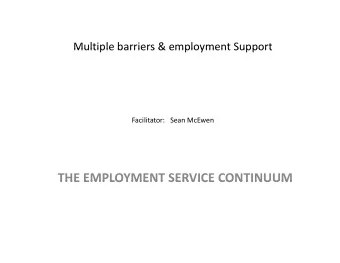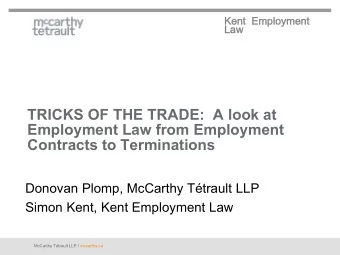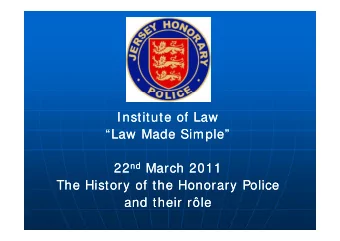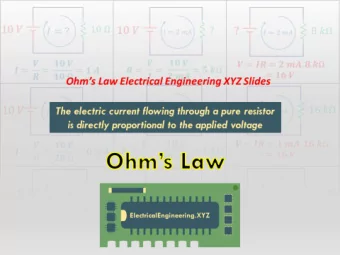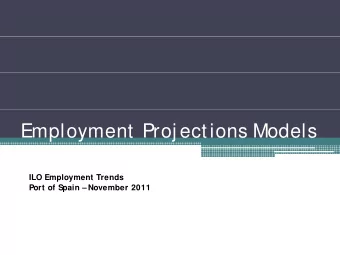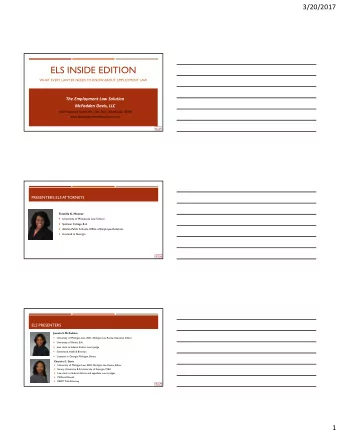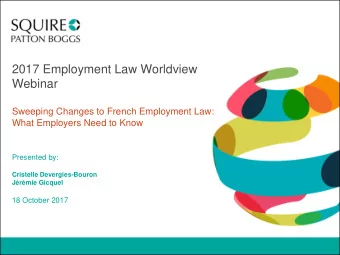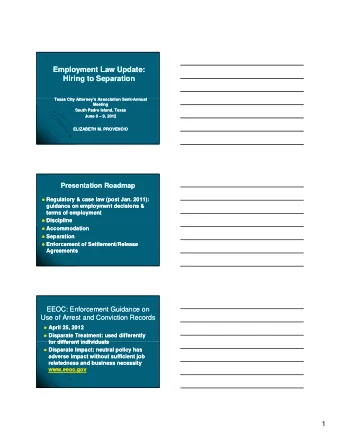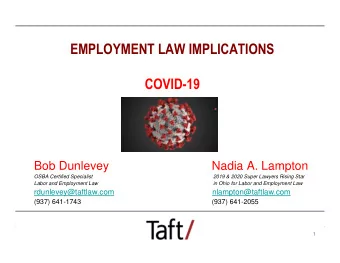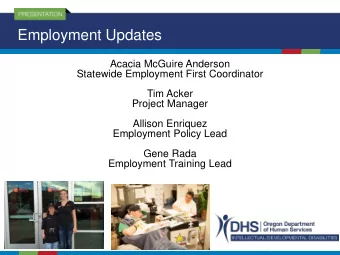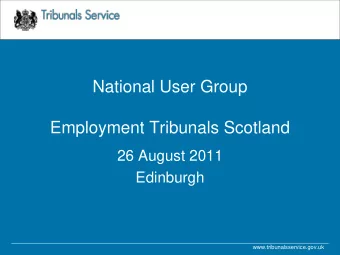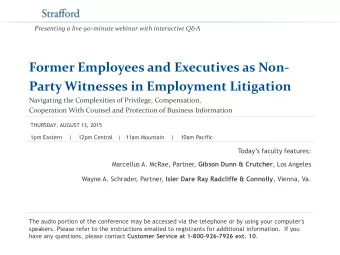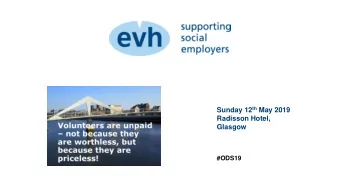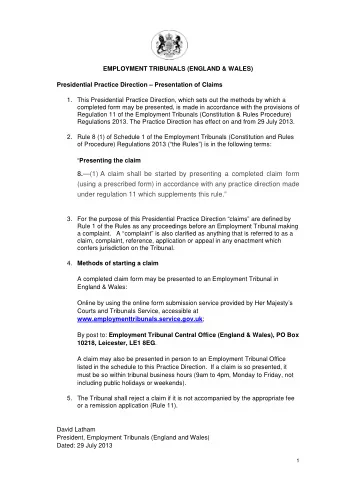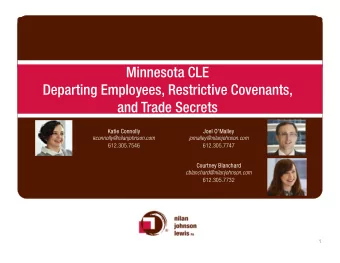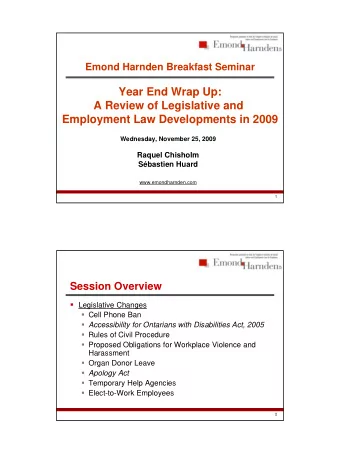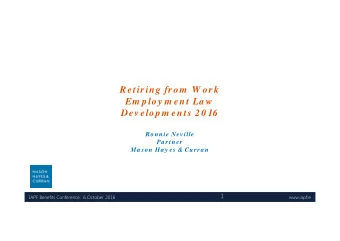
b Employment Law Fundamental to the proper functioning of the - PowerPoint PPT Presentation
b Employment Law Fundamental to the proper functioning of the workplace Protects employers and employees Benefits to compliance Consequences for non-compliance The Employment Relationship Employment law applies to all
b
Employment Law Fundamental to the proper functioning of the workplace • Protects employers and employees • Benefits to compliance • Consequences for non-compliance •
The Employment Relationship • Employment law applies to all employment relationships • Different conditions, dependent on: - Employee age - Employee experience - Employment sector - Job classification Our aim in this presentation is to provide you with the the basics which you need to know and inform you of additional information available.
Terms of Employment (Information) Act, 1994 & 2001.
Written Terms & Conditions of Employment A Legal requirement • Terms and Conditions of Employment are the basis of the employment relationship • Gives clear understanding to both parties • Protects employees from exploitation • Protects employers from false claims • Sample Terms of Employment available from NERA ( Click on link above to Download sample document. Please note: Powerpoint must be in Slide Mode and connected to Internet ) Terms of Employment (Information) Acts 1994 & 2001.
Details to be Included in Terms & Conditions • Name of employer and employee • Address of employer • Place of work • Job title/nature of work • Date of commencement of employment • Duration/expiration of contract (if temporary, fixed term or fixed purpose) • Rate of pay and pay intervals • Hours of work (overtime/shift patterns/Sunday Work) Terms of Employment (Information) Acts 1994 & 2001.
Details to be Included in Terms & Conditions • Rest breaks (including a procedure for complaints) • Annual Leave – other paid leave • Sick Leave • Pension Schemes • Notice employee is entitled to receive, and obliged to give • Collective agreements affecting employment • Details of the employee’s right to request and obtain written statement of average hourly rate of pay as per Minimum Wage Act, 2000 • Details of Grievance & Disciplinary Procedures (Good Practice) Terms of Employment (Information) Acts 1994 & 2001.
Click on Booklet to Download (Please note: Powerpoint must be in Slide Mode and connected to Internet)
National Minimum Wage Act, 1990. Payment of Wages Act, 1991.
Statement of Earnings (Payslip) An employee must be given a payslip with each payment of wages A deduction can only be made from wages where it: • is required by law (Tax and Social Insurance) • is made with the written consent of the employee (Trade Union subscription/Health Insurance) • is provided for in the written terms and conditions (board and lodgings) The gross wage and all deductions must be shown on the payslip National Minimum Wage Act, 1990. Payment of Wages Act, 1991.
Click on Booklets to Download (Please note: Powerpoint must be in Slide Mode and connected to Internet) National Minimum Wage Act, 1990. Payment of Wages Act, 1991.
Organisation of Working Time Act, 1997.
Maximum working hours & breaks Maximum 48 hour working week on average • Sunday work is subject to a premium • Average generally calculated over four months (in some cases • 6/12 months) Breaks must be given for • – 15 minutes within 4 ½ hours work – 30 minutes within 6 hours work (may include the above) – 11 hour daily rest period per 24 hours – 24 hour rest period per week following a daily rest period Organisation of Working Time Act, 1997.
Leave All employees are entitled to paid holidays • Entitlements are based on time worked • Three methods of calculation dependent on hours worked: • – 4 working weeks in a leave year – One third of a working week per calendar month – 8% of hours worked (subject to a maximum of 4 working weeks) • The law sets different holiday entitlements for some industries – visit the Labour Court Website at www.labourcourt.ie for details • Carers’ leave • Maternity and parental leave Organisation of Working Time Act, 1997.
Public Holidays There are nine public holidays each year • Employees must be given either: • – A paid day off on the day – A paid day off within a month – An extra day of holiday – An extra day of pay Public Holidays 1st of January First Monday in August St. Patrick’s Day (17th March) Last Monday in October Easter Monday Christmas Day (25th December) First Monday in May St. Stephen’s Day (26th December) First Monday in June Organisation of Working Time Act, 1997.
Click on Booklet to Download (Please note: Powerpoint must be in Slide Mode and connected to Internet) Organisation of Working Time Act, 1997.
Employment Permits Employment Permits Acts, 2003 & 2006
Who can work in Ireland? EEA nationals • Swiss nationals • Persons granted Refugee status • Persons granted temporary leave to remain on humanitarian grounds • Persons with specific immigration permission permitting them to work • Persons with Working Visa/Work Authorisation • Spouses, civil partners or dependents of an Irish or EEA national with • permission to remain Persons granted leave to remain as the parent of an Irish citizen • Persons not in the above categories require an employment permit to work in Ireland.
You need to know A PPS number doesn’t automatically mean a foreign national can work in • Ireland Working without a valid employment permit is a criminal offence for • both the employer and employee Employment permits are only granted for certain categories of work • People working illegally are more vulnerable to exploitation and abuse • People applying for asylum seeker status cannot legally work while their • application is under consideration A person cannot work while waiting for a work permit application to be • processed NERA carries out inspections to ensure compliance with the Employment • Permits Acts Any immigration matters will be referred to the Garda •
Employments ineligible for permits Clerical/Administrative • General Operatives/Labourers • Operator and Production Staff • Domestic Workers • Work Riders (Horse Racing) • Retail sales • Drivers including HGV • Childcare Workers • All tourism and catering staff except chefs • Employments which are highly skilled and salary over € 30,000 may apply for Green Card permit
Employment Permits 2013 • 453 breaches of Act • 48 prosecutions • Over 100 prosecutions pending
Protection of Young Persons (Employment) Act, 1996.
Employing Young People Specific rules apply to hours and times that people under 18 are permitted to work In addition, an employer must: • See a copy of a birth Certificate or other evidence of age before employing a person under 18 • Get the written permission of a parent or guardian before employing a person under 16 • Provide a summary of the Protection of Young Person’s Act to under 18’s within one month of the commencement date (leaflet available from NERA) • Display an official summary of the legislation in the workplace (poster available from NERA) • Keep a register of employees under 18 Protection of Young Persons (Employment) Act, 1996.
Click on Booklets or poster to Download (Please note: Powerpoint must be in Slide Mode and connected to Internet) Protection of Young Persons (Employment) Act, 1996.
Industrial Relations Act, 1946. Industrial Relations Act 1969. Industrial Relations Act, 1990. Organisation of Working Time Act, 1997. National Minimum Wage Act, 2000. Payment of Wages Act, 2000. Protection of Young Persons (Employment) Act, 1996.
Record Keeping By law all employers must keep employment records: • Key to demonstrating compliance • Protects employers and employees • Good business management • Records to be kept include: • Evidence payslips are given • Employee details • Job classification • Payroll details including deductions • Annual leave and public holidays • Hours of work • Register of employees under 18 • Written terms of employment Industrial Relations Act 1946, 1969, 1990. Protection of Young Persons (Employment) Act, 1996 Organisation of Working Time Act,1997 National Minimum Wage Act, 2000 Payment of Wages Act, 1991
Ending an Employment Relationship • Minimum notice periods apply after 13 weeks work – Employer must give 1-8 week’s notice dependent on length of employment – Employee must give 1 week’s notice • To justify a dismissal an employer must show it resulted from: – Lack of capability, competence or qualifications – Conduct – Contravention of another law – Other substantial grounds – Redundancy
Inspections • Inspections may be by appointment or unannounced • Inspectors carry warrant card • Records will be examined • Employer will be interviewed • Employees will be interviewed • Carry out Joint Inspections and share information with Revenue and Social Protection • Compliant employers, or those willing to become so, have nothing to fear, non-compliance can usually be resolved through communication and cooperation
Inspector powers • Provided for in each Act • Entry to workplace • View, take/copy records • Interview persons • Exchange information • Offence to obstruct/mislead Inspector
Recommend
More recommend
Explore More Topics
Stay informed with curated content and fresh updates.
